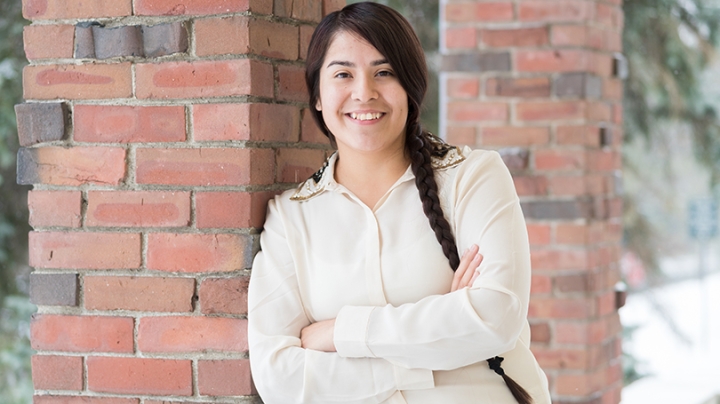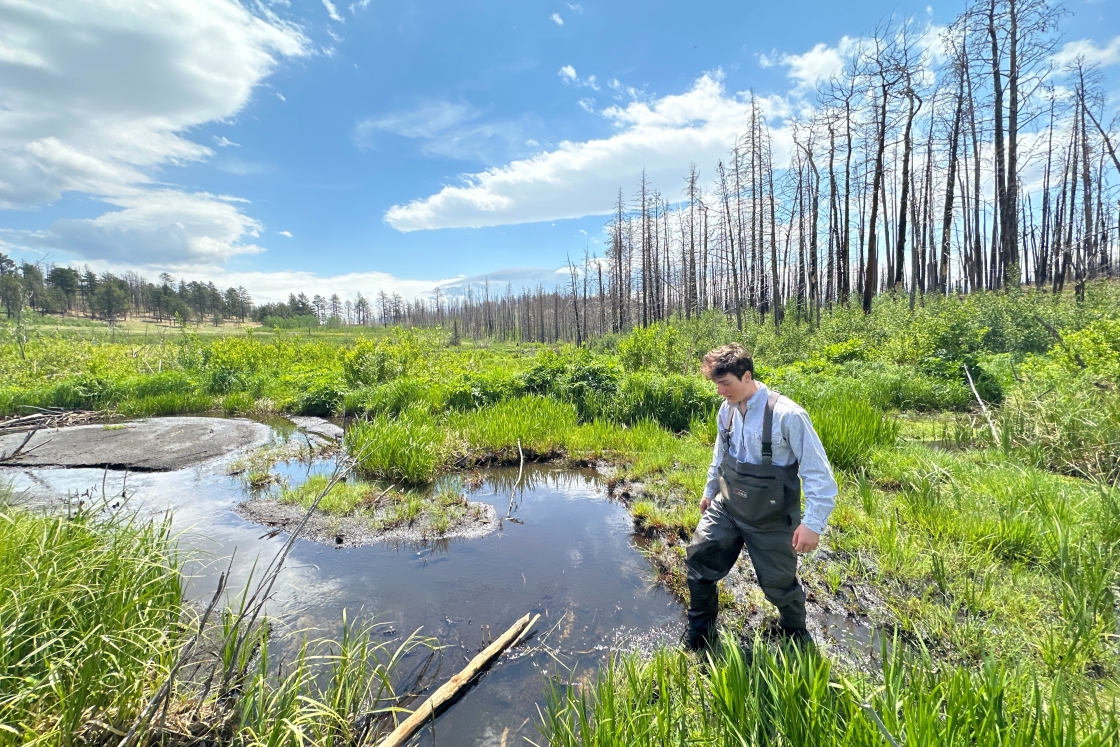Growing up on a ranch on the Crow reservation in Montana, surrounded by family—her mother, father, twin sister, aunts, uncles, cousins, and grandparents—JoRee LaFrance ’17 knows the power of storytelling.
“My grandmother, Joan Horn, has always been the person we all go to,” LaFrance says. She recently began using her smart phone to record her grandmother’s tales. Her favorite is about a boy raised by bighorn sheep.
“His stepfather pushes him over a cliff, but he gets caught on a tree and hears voices talking in Crow,” LaFrance explains. The “voices” belong to bighorn sheep who end up raising the boy until he can be returned to his family. The moral: Speaking your native language, and living in harmony with animals, can save your life.
JoRee LaFrance ’17 and her great-grandmother visit during the 2015 Crow Fair celebration in Montana. “Her name is Joan Horn but we call her ‘kaale,’ which is grandma in Crow. She is 87 years old and is the matriarch of our family. She is the motivation and inspiration behind my Dreamstarter project to create children’s books in Crow.” (Photo courtesy of JoRee LaFrance)
“I have seen the actual place where this story is supposed to have taken place,” LaFrance says. She’s fascinated by the connection between land and storytelling in Native American history. Many of the stories she likes best are ancient fables, yet, she says, “we still live on this land, and we can actually visit the places they are about.” To document that geography of narrative, she has just received a $10,000 “Dreamstarter” grant from Running Strong for American Indian Youth, a nonprofit foundation dedicated to “creating lasting change in the lives of American Indian people.”
LaFrance wants to bring this about by finding new ways to preserve Native American oral tradition. She’s planning to bring tribal elders into schools on her reservation, where they will tell stories, recorded by teachers. As they listen, students will illustrate the stories—by hand, in the elementary school, and, in the high school, using computer software.
“This is how we will create books,” La France says. “I am developing a step-by-step composing process that any student could follow.” To set an example, she will compile stories she’s been collecting from Crow elders, including her grandmother.
“That’s always been my dream,” she says, “to write a book like this for children.”
LaFrance is also creating an interactive map, showing the sites where the stories she’s collecting take place. “If someone wants to hear a story they will be able to click on a pinpoint on the map,” she says.
In addition to the Dreamstarter grant, support for LaFrance’s storytelling projects comes from the scholarship she received from the Stamps Family Charitable Foundation, which rewards “exceptional students who exemplify leadership, perseverance, scholarship, service, and innovation.” LaFrance meets those criteria with a double major in earth science and Native American studies and a minor in anthropology.
As she helps keep storytelling traditions alive, she also wants to protect the environment and improve tribes’ economy by exploring new modes of sustainable energy. She has just landed an internship at the U.S. Department of Energy, working on clean coal and carbon storage on tribal lands. “Ultimately, I would love to work on energy development in the Office of Indian Policy at the DOE,” she says.
Whatever career path she takes, LaFrance plans to stay connected to her cultural heritage. She makes her own traditional dresses, leggings, and moccasins, and she was “Miss Crow Nation” during her senior year of high school. She admits it wasn’t easy, at first, adjusting to college so far from home, because she missed her many relatives on the reservation. “Family is everything to me,” she says.
But she has conquered her homesickness and taken full advantage of opportunities that have come her way. At Dartmouth, she has studied federal Indian law and environmental issues affecting indigenous peoples, traveling to New Zealand to work with the Maori.
She’s also collaborated with creators of an interactive website called “It Gets Brighter,” which raises awareness about problems affecting Native American youth. Young people can share their video messages online about mental health issues, including suicide, which she says have affected her friends and family.
La France, whose Indian name, iichiinmaachileesh, means “fortunate with horses,” finds herself in two worlds: the Crow Nation and academia. She’s building bridges between them, using newfound knowledge, including technology, to help Native American nations sustain their traditional way of life as they improve their economy.
“I really want a better world for future generations,” she says.


